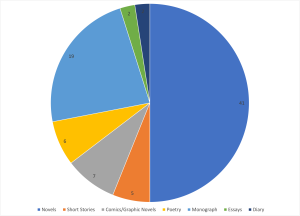Video: Stephen Colbert on the Boston Marathon Bombings
So, this week did not get off to the best start. I lived in Boston for a while, and I know quite a few people there, and so I spent about an hour on Monday on the phone and on Facebook and on Gchat making sure that nobody I knew was dead or injured. They weren’t, thankfully, but there are far too many people who cannot say that. My first reaction to the news of the bombing was to think, “people are so awful.” It’s worth keeping in mind that people are also pretty amazing, and that we shouldn’t let the former trick us into ignoring the latter.
With that said, I’m going to post the rest of this stuff as if his were a normal week— because what else can you do, after all. As usual, get all the articles as a Readlist here.
Article: “When Dickens Met Doestoevsky” by Eric Naiman
The totally fascinating story of a marginal scholar who (spoiler) created a whole network of imaginary people to review and comment on his own works— and how one of these imaginary writers got cited in a major new biography of Charles Dickens, resulting in a meeting between Dickens and Dostoevsky that never happened entering the popular imagination in a way that will probably prove difficult to dislodge. It’s a great piece of detective work, and a much more compelling story than a chase through the footnotes should be.
Article: “Howard Glodblatt’s Life in Translation” by Aimee Levitt
A well-known statistic is that only three percent of the literature published in the U.S. every year is translated from another language; I’ve always thought that at least part of the reason for this is that works in translation always sound translated— awkward, stilted, unnatural. I want translations to read as though they were written by a native English speaker, but really that’s an aesthetic and normative argument, and not simply a question of quality (as I like to imagine). It’s always interesting to me to see how people who actually do translations think about this. This piece is partly a capsule biography of Howard Goldblatt, the most prominent contemporary translator of Chinese literature into English (including the work of recent Nobel Prize winner Mo Yan), and partly a discussion of the problems of translation in general. How do you maintain a sense of the differences in style between two authors while shifting them from one idiom to another? How do you avoid making their style into your style? It seems to me that answering these questions is a prerequisite for solving the three percent problem.
Poem and Commentary: “The Waste Land” by T.S. Eliot on RapGenius
I am in no position to judge the quality of the annotations here, but…wow. Probably about 75% of the lines here have some kind of comment or expansion or explanations. “The Waste Land” is an infamously difficult and allusive poem, and for most of us having some kind of guide as we read it is a must, but I have to admit that RapGenius was not the first place I would have looked for that. Again, I don’t know if the notes here are “correct” or reflect the scholarly consensus or anything, but it’s still a pretty remarkable example of somebody contributing a tremendous amount of time, unpaid, to making something that other people can use for free.
Article: “Maximal Meaning in Minimal Space: the History of Punctuation” by Keith Houston
If you are not interested in a concise history of punctuation— not specific marks, really, but the idea of punctuation— then you and I are not destined for each other. Did you know, for instance, that the indentation at the beginning of a paragraph is where scribes used to put the “pilcrow” (what I have always referred to as a “paragraph symbol”)? I was unaware of this site before now, but I will be keeping an eye on it from now on. Houston also has a book about this coming out in September, for those who want to know more— and, again, if you are not one of those people, well, then, you and I are only going to go so far together.


